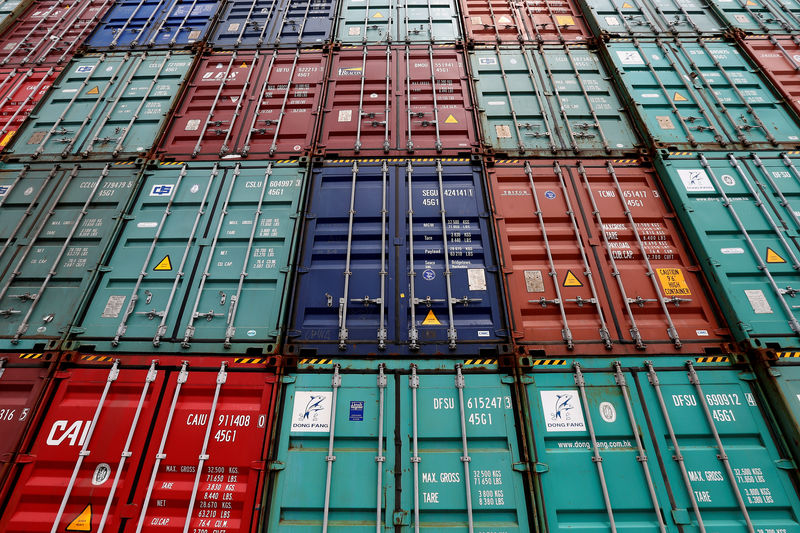By Shrutee Sarkar
BENGALURU (Reuters) - The recent escalation in the U.S.-China trade war has brought forward the next U.S. recession, according to a majority of economists polled by Reuters who now expect the Federal Reserve to cut rates again in September and once more next year.
Despite expectations for further easing, the Aug 6-8 poll gave a median 45% probability of the U.S. economy slipping into a recession in the next two years, up from 35% in the previous poll and the highest since that question was first asked in May 2018.
A closely-watched bond market gauge of U.S. recession risk flashed its biggest warning since March 2007 on Monday, underscoring concerns the spillover from the battle between the world's two biggest economies over trade will accelerate a global downturn.
For a Reuters poll graphic on U.S. recession probability, click https://tmsnrt.rs/2O50W4M?eikon=true
Last week, U.S. President Donald Trump said a 10% tariff on an additional $300 billion of Chinese goods will be added, starting Sept. 1 and Washington on Monday branded China a currency manipulator.
Beijing warned that move would "severely damage international financial order and cause chaos in financial markets," while preventing a global economic recovery.
Nearly 70% of economists responding to an additional question said the latest developments had brought the next U.S. recession closer.
"Certainly, escalating trade tensions through higher tariffs and restricted access to markets is hurting sentiment, increasing costs, damaging supply chains and weakening corporate profitability," wrote James Knightley, chief international economist at ING.
"This then feeds through into consumer sentiment and spending more broadly in the economy with recession risks mounting."
With the Fed's preferred gauge of inflation - core PCE prices - not expected to rise significantly, the central bank is forecast to cut rates by 25 basis points in September, taking the fed funds rate to 1.75-2.00%. It is then expected to ease again late next year.
Last month, economists predicted a follow-up rate cut after July's in the fourth quarter, but no more through next year.
Financial market traders have ramped up bets for more rate cuts, pricing in September, followed by another 25 basis point cut in October, and a more than a 40% chance of another in December.
But it is not clear policymakers are keen to cut rates again, let alone several, especially after Fed Chair Jerome Powell downplayed the latest reduction as "a mid-cycle adjustment to policy."
"By cutting rates, the Fed is unintentionally underwriting the trade war," said Aditya Bhave, senior global economist at Bank of America Merrill Lynch (NYSE:BAC).
"We worry about an adverse feedback loop in which the Fed eases and things get better: financial markets, the economy and so on. That encourages more escalation in the trade war - things get worse and then the Fed eases again."
Indeed, Federal Reserve Bank of St. Louis President James Bullard said this week that the central bank would not deliver an interest rate cut each time there were policy threats or announcements on the trade war that roiled markets.
Asked if the U.S. economy needs more rate cuts this year nearly three-quarters of respondents said yes. But the rest did not.
"The Fed is under the illusion that this is a mid-cycle adjustment, and that by delivering a few insurance cuts they can defer the recession," said Philip Marey, senior U.S. strategist at Rabobank.
"They don't need to cut at the moment. But in their calculation they think if they do it now then they won't have to later, and I think that will all be in vain."
According to the latest Reuters poll, U.S. economic growth was forecast to slow to an annualised rate of 1.8% by end-2020 from the 2.1% reported for last quarter and well below the 3.1% rate in the first.
That consensus was little changed from last month, even though a higher number of economists now predict a substantial slowdown despite the shift in expectations for Fed easing.
The more difficult prediction is trying to gauge what President Trump will do or say next.
"Trump is playing a game of chicken. He thinks by adding more punitive measures...he will bring down the Chinese economy and force them to act quickly," Rabobank's Marey said.

"He hopes in the end the Chinese will blink and come to the table and give him what he wants."